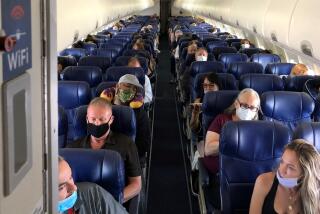Ban on Flying of Old Oxygen Units Urged
WASHINGTON — Airlines should be permanently barred from transporting outdated chemical oxygen generators like those suspected in the deadly ValuJet crash, the National Transportation Safety Board said Friday.
The board also called on the Federal Aviation Administration to immediately reevaluate air carriers’ methods for identifying hazardous materials in baggage and cargo.
ValuJet Flight 592 plunged into the Florida Everglades on May 11, killing all 110 people aboard. In the moments before the crash the crew reported smoke in the cabin and an unidentified noise.
FAA Administrator David Hinson said he agrees “with the thrust of the recommendations” and that his agency will review them as quickly as possible.
The NTSB said its investigation indicated that the plane was carrying five cardboard boxes with as many as 144 chemical oxygen generators. Suspicion has focused on whether those could have caused a blaze that brought the plane down. The generators heat to more than 450 degrees Fahrenheit when triggered and the oxygen they produce can feed a blaze.
“Although the origin of the in-flight fire on board Flight 592 has not been determined to date, the presence of the chemical oxygen generators in the forward cargo compartment of the aircraft created an extremely dangerous situation,” said the statement from NTSB Chairman Jim Hall.
Although the accident remains under investigation, the safety board issued four urgent recommendations to the FAA:
* Ban permanently the transport of oxygen generators as cargo on passenger aircraft when the generators have passed their expiration date but have not been discharged.
* Immediately evaluate the practices and training of air carriers for identifying undeclared hazardous materials in baggage and cargo.
* Based on that evaluation, require carriers to improve training as needed.
* Prohibit transport of oxidizing materials in cargo compartments of airliners that do not have fire or smoke detection systems.
In other news, ValuJet Inc. denied press reports that 50 of its flight attendants have resigned since the crash.
The low-cost carrier, which has sharply curtailed operations in light of a comprehensive federal safety probe, confirmed that 20 flight attendants did leave its service over the past three weeks because of concerns about flying.
More to Read
Sign up for Essential California
The most important California stories and recommendations in your inbox every morning.
You may occasionally receive promotional content from the Los Angeles Times.










